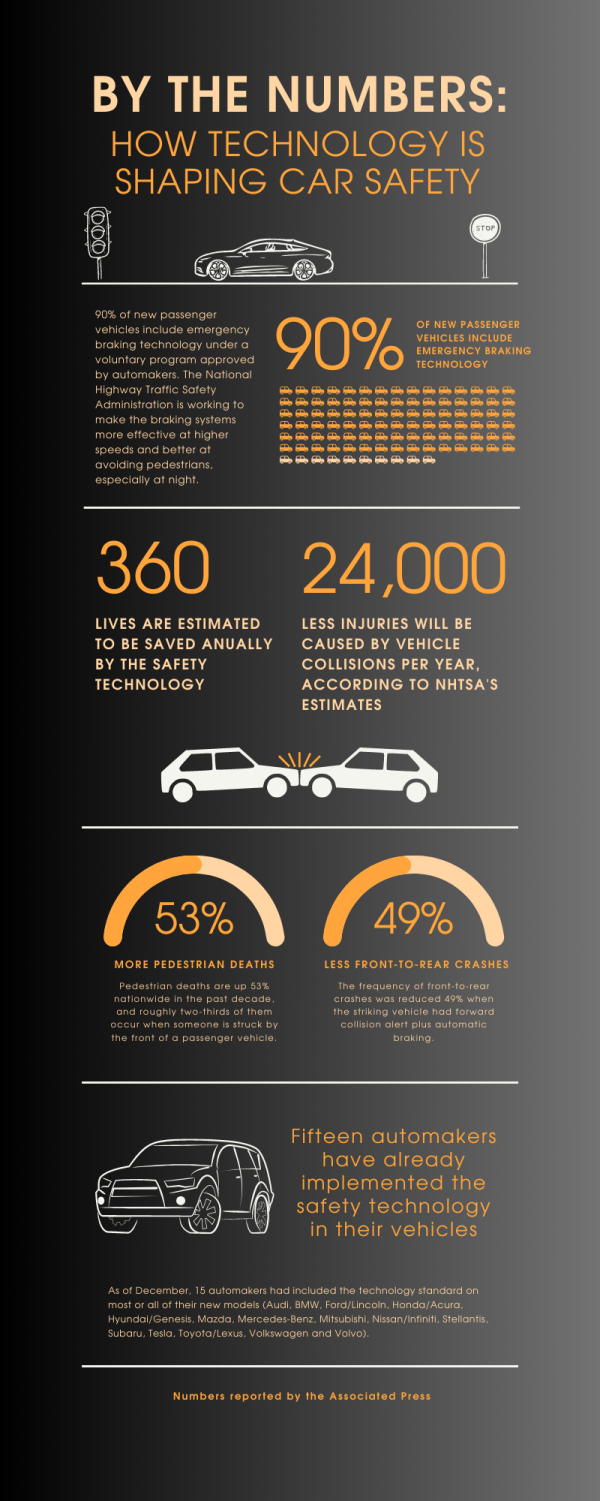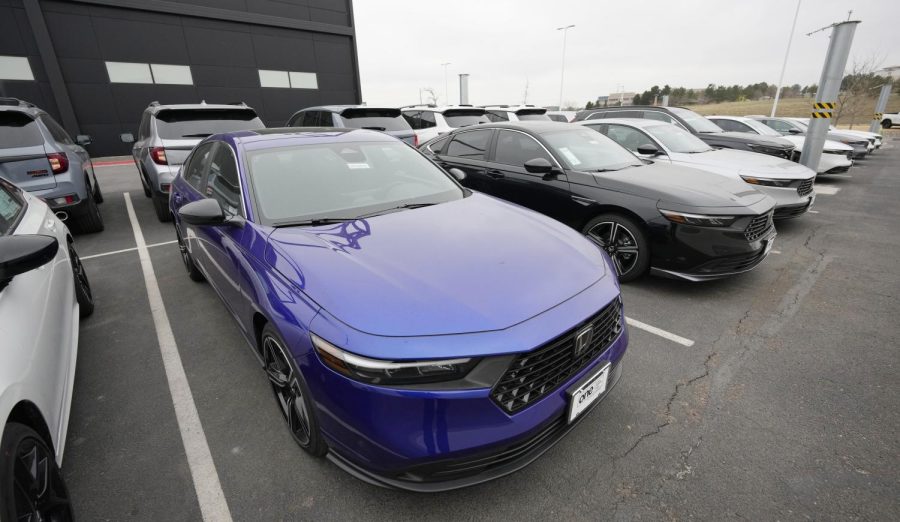US government mandates life-saving emergency brakes on new cars (Infographic)
Approximately 90% of new passenger vehicles already include the braking technology, which is estimated to prevent 24,000 injuries annually.
DAVID ZALUBOWSKI / Associated Press
2024 Accord sedans are displayed at a Honda dealership on April 14, 2023, in Highlands Ranch, Colo. The U.S. government’s auto safety agency is moving to require that all new light and heavy-duty vehicles be equipped with potentially life-saving automatic emergency braking.
May 31, 2023
WASHINGTON — The U.S. government’s auto safety agency plans to require that all new passenger cars and light trucks include potentially life-saving automatic emergency braking and meet stricter safety standards within three years.
Ann Carlson, the safety agency’s chief counsel, said 90% of new passenger vehicles already include the braking technology under a voluntary program that automakers approved, but the NHTSA wants to make the braking systems more effective at higher speeds and better at avoiding pedestrians, especially at night.
The regulation proposed by the NHTSA will require, for example, that the systems allow vehicles to fully avoid other vehicles at up to 50 mph if a driver should fail to react. If a driver brakes some but not enough to stop a collision, the system would have to avoid hitting another vehicle at up to 62 mph.
“With this proposal, we could change a high-speed crash from a deadly one to a lower-speed crash with minor injuries or just property damage,” Carlson said.
Today .@NHTSAgov is proposing a rule to make AEB mandatory in all vehicles and pedestrian AEB mandatory in light duty vehicles, requiring FULL crash avoidance, a shift that would make roadways safer for all. ?? pic.twitter.com/VlKQvZt64z
— danisimons (@danisimons) May 31, 2023
The regulations will undergo a 60-day public comment period before the NHTSA will decide on a final version.
The agency says the technology will dramatically reduce rear-end crashes, saving what it estimates would be at least 360 lives per year. It also will cut injuries by at least 24,000 annually, according to the NHTSA’s estimates, and reduce property damage.
The Transportation Department, which includes the NHTSA, called the proposal an important step in the broader goal of reducing roadway deaths.
Though the number of people killed on U.S. roadways declined slightly last year, agency officials said the 42,795 who died still represented a national crisis. Traffic deaths did slow slightly in the fourth quarter of last year — the third straight quarterly drop — but the pace was still close to the 2021 numbers, the highest in 16 years.
With Wednesday’s announcement, the NHTSA is responding to rules approved by Congress in 2021 to require automakers to equip new passenger vehicles with automatic braking and other technology. Automatic emergency braking can detect objects in the way and stop or slow a vehicle, thereby preventing a crash or making it less severe.
Carlson said the new rule will require braking systems to spot pedestrians in the dark to potentially save the lives of walkers and cyclists. Pedestrian deaths, she said, are up 53% nationwide in the past decade, and roughly two-thirds occur when someone is struck by the front of a passenger vehicle. All cars would be required to stop and avoid hitting a pedestrian at up to 37 mph.
Officials said many systems that automakers are installing will have to be improved to make them more effective in darkness.
William Wallace, associate director of safety policy for Consumer Reports, said he welcomed the NHTSA’s proposal as strong and justified.
“NHTSA is setting a high bar for safety, and using the tools at its disposal to get the auto industry to protect as many people as possible,” he said.
It may take more than camera-based systems for automakers to meet NHTSA standards, especially at night or in inclement weather, Wallace said. Still, many of the changes the agency wants can be achieved through software updates.
Consumer Reports found government safety requirements have not added much to the cost of vehicles once the prices are adjusted for inflation, Wallace said.
The Alliance for Automotive Innovation, an industry trade group, was still evaluating the NHTSA’s proposal, officials said in a statement Wednesday.
New NHTSA regulations will eventually supplant a 2016 voluntary agreement between the agency and 20 automakers to make automatic emergency braking standard on 95% of passenger vehicles by the end of the 2023 model year, but there were no standards specified in that agreement.
Would you want your car to have automatic emergency brakes? ? #carsafetytechnology
— Southwest Journalist (@SWJournalist) June 1, 2023
As of December, 15 automakers had included the technology standard on most or all of their new models. General Motors officials said Wednesday that automatic emergency braking will be standard on 98% of the company’s new vehicles by Aug. 31, the end of this model year. The four remaining automakers were close to hitting 95% in December.
A study last year by The Partnership for Analytics Research in Traffic Safety found that the frequency of front-to-rear crashes was reduced 49% when the striking vehicle had forward collision alert plus automatic braking compared with vehicles that lacked either system.
Automatic braking systems do not come without bugs, though. The NHTSA has opened three investigations into systems from Tesla, Honda and Freightliner that activated the brakes for no apparent reason.
Markus Price, NHTSA division chief for visibility and injury prevention, said the new regulation is designed to reduce false braking by the systems.
“We’ve considered that in the rule,” he said. “We have a couple tests that help mitigate that.”

____
Krisher reported from Detroit.



